Buses in Wales to be brought under public control
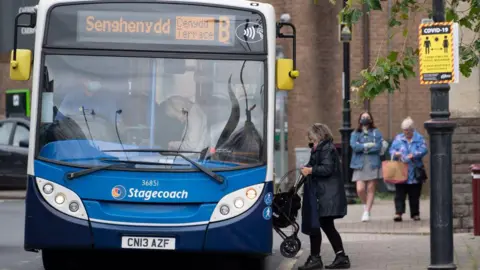 Getty Images
Getty ImagesPlans to create a London-style bus network in Wales have been launched.
Legislation has been published that, once passed by the Senedd, will begin putting buses under public control and allow officials to decide what services are provided.
Welsh Labour wants bus companies to bid for contracts instead of operating their own routes, following years of cuts and falling passenger numbers.
There are warnings the new network will need substantially more money to function with costs estimated at more than £620m over 30 years.
The proposals - first published six years ago - could take another five years to deliver.
Since the mid 1980s, private companies have been able to run buses where they want as long as they are registered and meet safety standards.
Critics say it leaves services vulnerable to being axed if they do not make a profit.
In London it works differently, with operators bidding for set routes laid out by Transport for London.
The Welsh governments wants to set up franchises overseen by Transport for Wales (TfW), which it owns.
TfW would set the routes, timetables and fares with councils before companies bid to deliver the service for a fixed fee.
As in London, buses could also be branded the same.
Ministers would take over ticketing and IT and acquire their own bus depots and are promising a "simpler, connected and joined up public transport network".
Documents published on Monday put the total cost at £623m over 30 years, but the Welsh government said the scheme will "require additional investment" if its objectives are to be realised.
The Welsh government already hands over money to the industry to pay for bus passes and subsidise routes - estimated at £600m between 2021 and 2026.
Other parts of the UK, including Manchester, have started introducing bus franchises.
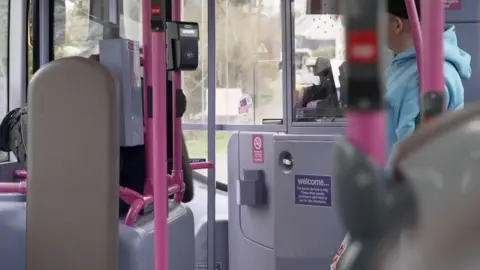
First Cymru runs the X6 service from Ammanford to Swansea city centre.
Rupika, 34, travels between Swansea, Neath and Bridged by bus for her work as a baker.
"It's much, much cheaper than the train," she said.
"When I come from Bridgend in the evening, the last bus I get is at six, but I feel it should be extended to eight because there are a lot of people who travel after that."
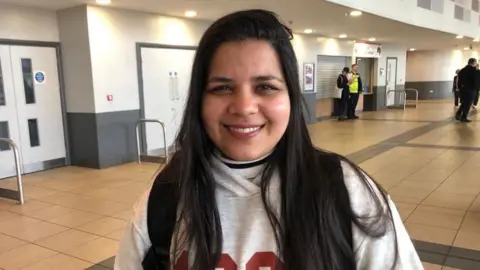
Denver Gough, 67, of Trebanos, said the service was "pretty good" but "sometimes going back they're not so reliable".
He said putting the public sector in charge of the bus system made sense.
"I don't think buses got any better from when they were de-nationalised to be honest with you," he said.
"They cut the services. If you go back to the old days there were more buses than there are now, especially up in the valleys."
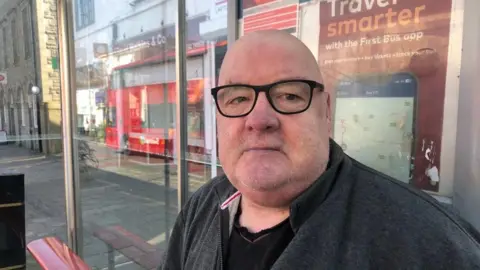
Don Cornell, of Hafod in Swansea, said he used his bus pass nearly every day to do his shopping or get into town.
"It's not reliable, I'll tell you that now," he said as he waited for his bus.
"Only one bus goes through the Hafod, the number six, so if that doesn't turn up you're waiting an hour - and most of the time it doesn't turn up."
Deborah Burr, 63, said she caught buses in the city several times a week.
"It's difficult, you can't blame the drivers because you've got roadworks and all the rest of it, and I understand that," she said.
"But at the end of the day, I just want to go home or wherever it is I have to go."
The new law will make it an offence for private companies to run local bus routes within unless allowed by the Welsh government through a franchise contract or permit.
It gives the Welsh government powers to step in to run buses, such as if a contract failed, and allows councils the freedom to establish new bus services.
Barclay Davies from Bus Users UK said franchising "can be great for passengers, but it's not cheap".
"It will require significant amounts of funding. That's the issue at the moment – how much funding is available."
He said TfW, which already runs the rail network, would need to "manage people's expectations".
"If the funding isn't available they are going to have to cut their cloth accordingly, so you might not have the frequency of services that people want and expect."
The Welsh government said last year that franchise contracts could put TfW "at risk from decreases in passenger fare revenue".
Essential services are already subsidised by the taxpayer, but the number of journeys on local buses has dropped to 61 million in 2022-23, compared to 91.7 million in the last full year before the pandemic.
The bus industry said it wanted contracts that "combine central control with a focus on customers and commercial incentives to deliver improvements".
Officials say they will talk to the industry to make sure small bus businesses are not squeezed out by big companies getting all the franchises.
Government documents highlight some of the "risks" of the policy and how the government plans to deal with them.
Under the type of contracts being considered, the government would decide how to spend the income generated by bus fares.
But it would also "carry the financial risk" from changes in the revenue generated.
Asked why the government was taking that risk, Transport Secretary Ken Skates told BBC Wales on Monday: "It's worth it.
"We've proven with the network we control - the Traws Cymru network - that you can drive up passenger numbers and thereby drive up the farebox, if you make services responsive to peoples' needs."
Aaron Hill, director of lobby group Confederation of Passenger Transport Cymru, said: "Simply changing who's in charge won't guarantee success – passengers will only see better buses if commitments are backed by adequate funding and by steps to speed up buses by taking them out of traffic congestion."
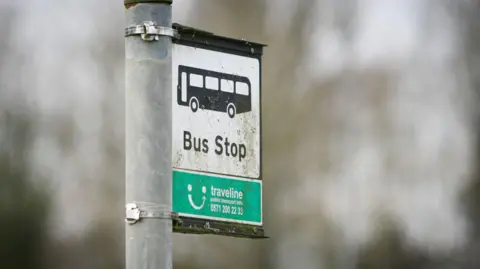 Getty Images
Getty ImagesWelsh Conservative transport spokesman Peter Fox said the plan "comes with risks if not executed properly, stifling competition and becoming yet another taxpayer-funded money pit".
Plaid Cymru transport spokesman Peredur Owen Griffiths added: "Bus franchising is a step that is integral to the future of sustainable, affordable and reliable bus services for the future, which makes the Labour government's delay in its implementation frustrating."
Under government plans, franchising will be rolled over the next five years, starting in 2027 in south-west Wales where First Cymru, one of the biggest bus companies, operates.
Its commercial director Rob Pymm said First would "fully embrace" franchising if it goes ahead, saying he hoped the company "will be running those services".
Additional reporting by David Deans
